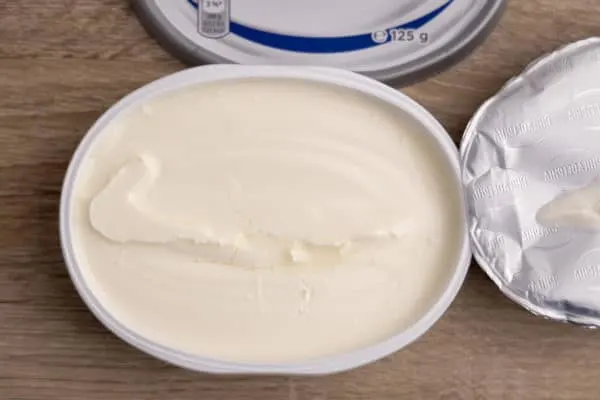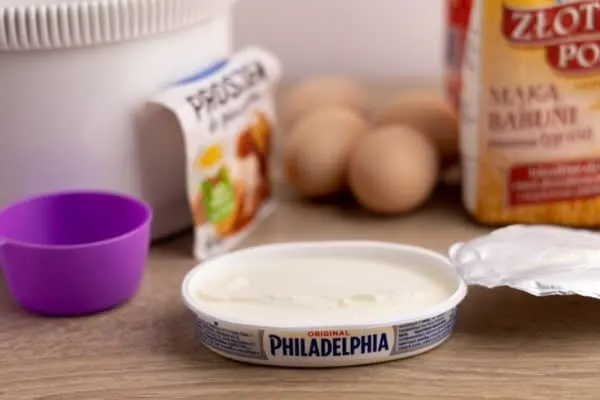Let’s talk about the shelf life and spoilage of cream cheese. Learn how long cream cheese lasts after opening or beyond the printed date, and how to tell if it’s spoiled.
Say you just opened a cream cheese container, and you’re wondering how long cream cheese lasts after opening.
Or maybe yours is a week or so past the printed date, and you want to know if it’s still any good and what spoilage signs you should look out for.
Sounds like you?
If so, you’re in the right place. Let’s jump right in.

Table of Contents
- Does Cream Cheese Go Bad?
- How to Tell if Cream Cheese is Bad?
- How Long Does Cream Cheese Last?
- Can You Freeze Cream Cheese?
Does Cream Cheese Go Bad?
All dairy products spoil at some point, and cream cheese is no different. All you get is a couple of weeks of storage in the fridge before the dairy product turns sour or grows mold if it’s opened.
(If you want a shelf-stable substitute that lasts way longer, feel free to test out cream cheese powder. Or, if you’re looking for a shelf-stable cheese product, check out Velveeta cheese.)
Knowing that, let’s talk about spoilage signs.

How to Tell if Cream Cheese is Bad?
Cream cheese is bad if it’s moldy, has any dark specs on the surface, or has separated into a dense white layer on the bottom topped with water. It’s also no good if it smells “funny,” off, or has turned too sour due to prolonged storage.
Those are the spoilage signs in a nutshell.
Now, let’s briefly touch upon the details of each point.
First, the cheese is no good if there’s mold or any other discolorations on the surface. No ifs or buts. While it’s typically okay to remove mold spots from harder cheeses, this is not the case with softer cheeses like cream cheese (or cottage cheese).
Likewise, if your cream cheese has turned yellow, it’s no good.
(The same can happen to spoiled sour cream.)
When it comes to separation, a bit of water on the surface is normal and nothing to worry about. You can drain it or stir it in, depending on your preferences.
But if the whole thing is no longer smooth and creamy but has separated into two distinct layers, the dairy product is no good.

Once you’re done checking the appearance, give the cheese a good whiff. If it smells off, “funny,” or sour, discard it.
The final piece of the puzzle is assessing the product’s taste. If it’s been refrigerated for way longer than it’s supposed to, it’ll likely taste sour.
Plain cream cheese is supposed to be slightly tangy, but that’s about it. If the acidity is overpowering, ditch it for quality purposes.
Last but not least, mind the printed date. If the cheese is more than, say, three weeks past the printed date, assume it’s no good no matter how well it presents itself.
Speaking of dates, let’s talk about the shelf life of cream cheese.

How Long Does Cream Cheese Last?
Cream cheese has a shelf life of a couple of weeks and typically lasts for a week or two beyond the printed date. Once you open the container, you should finish it within two weeks and make sure it’s always tightly sealed and refrigerated.
Cream cheese comes with a printed date that’s 4 to 8 weeks after it’s been produced. That’s noticeably longer than other fresh cheeses, like ricotta or cottage cheese, both of which last only a couple of weeks at best.
That longer overall shelf life also translates into longer storage time after opening and past the printed date. We’ll cover both in a minute.
Now, as usual with dairy products, the mentioned storage period isn’t guaranteed. If the cheese is mishandled before you buy it (say, it sits at room temperature for too long before it gets to the refrigerated section), it’ll likely go bad much sooner.
Because of that, you should always give your dairy products a once-over before using them, even if the use-by date is well in the future.
After Opening
After opening your cream cheese, it should retain quality for up to two weeks if you keep it tightly sealed in the fridge. But if it’s already past the printed date, don’t expect it to stay nice and fresh for more than a few days, maybe a week.
That said, your cream cheese will gradually degrade in quality the longer you store the leftovers. There will be more water separated from the cheese, and you’ll likely notice more acidity in both smell and taste.
(Again, cream cheese is slightly tangy, but that’s it.)
When the sourness takes over, discard it.

After Expiration Date
Cream cheese usually lasts one to two weeks beyond the printed date, but that’s not a hard and fast rule. Always give your “expired” cream cheese a thorough check before using it, and discard it if it’s more than 2 to 3 weeks past its date.
Unlike other fresh cheeses, cream cheese keeps for a while beyond the printed date. Why is that, you ask?
It’s pretty simple: cream cheese has a pretty long overall storage time. It’s not a stretch to expect a product that easily keeps for eight weeks to last until week 10. But it’s definitely a stretch to expect one that lasts two weeks to keep until week 4. You get the idea.
Of course, this two-week period is only a rough estimate, so don’t be surprised if your cream cheese turns sour much sooner. Again, always look for signs of spoilage before using out-of-date cream cheese.
Can You Freeze Cream Cheese?
Cream cheese can be frozen with some success. Because the texture will become crumbly, you should save previously frozen cream cheese for dishes where it will be cooked.
Once thawed, the cheese will likely no longer spread on a bagel, and may be slightly unpleasant tasting until heated thoroughly.

To freeze cream cheese, make sure you wrap it tightly so that no air may come in contact with the cheese. This is necessary to ensure that the cream cheese neither dries out nor absorbs any smells from the freezer.
The freezer will dry out cream cheese over time. Because of that, it’s best to freeze cream cheese for no more than a couple of months.
You can thaw cream cheese overnight in the refrigerator and then use it for cooking or baking.
